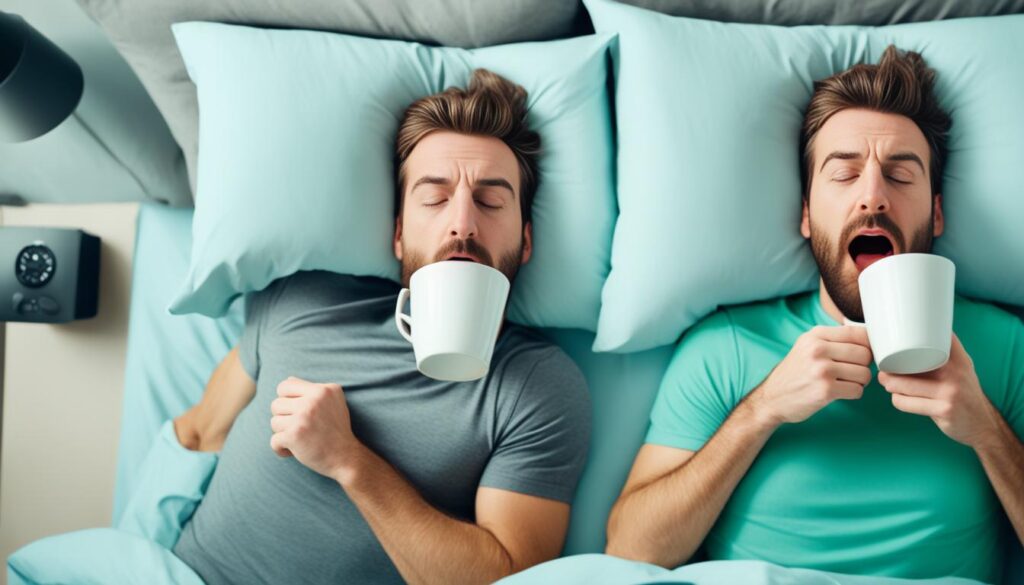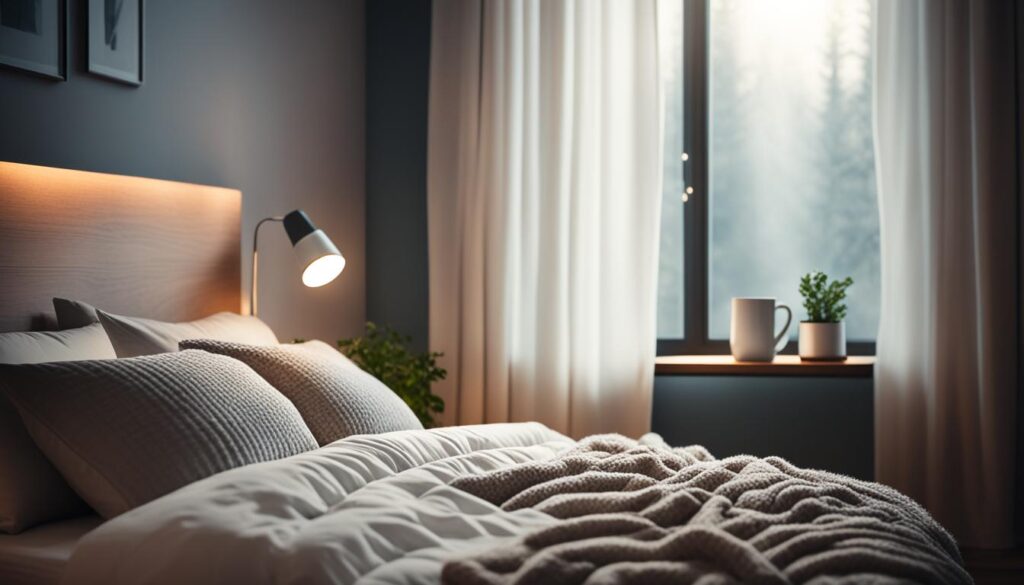Welcome to our article on finding the perfect balance between coffee and sleep for restful nights and overall well-being. Coffee and sleep are two fundamental elements of our daily lives, but often, they can seem at odds with each other. In this article, we will explore the benefits of coffee and sleep, as well as provide tips on how to maintain a healthy balance between the two. So, if you’re someone who loves their morning cup of joe but also values a good night’s sleep, read on!
Key Takeaways:
- Finding the right balance between coffee and sleep is essential for restful nights and overall well-being.
- Coffee has numerous benefits, including protection against neurodegenerative diseases, improved focus, and increased strength during physical activity.
- Sleep is crucial for our overall health and well-being, supporting cognitive function, immunity, and emotional well-being.
- Caffeine, found in coffee, can interfere with sleep quality if consumed too close to bedtime.
- Striking a healthy balance requires mindful coffee consumption, optimal timing, and considering alternatives for better sleep.
The Benefits of Coffee
Coffee has numerous benefits for our health and well-being. It has been linked to protection against neurodegenerative diseases like Alzheimer’s and Parkinson’s, improved focus, alertness, and mood, headache relief, increased strength and oxygen intake during physical activity, and more. However, it’s important to consume coffee in moderation and be aware of its potential side effects.
Protection Against Neurodegenerative Diseases
Coffee has shown promising potential in providing protection against neurodegenerative diseases such as Alzheimer’s and Parkinson’s. Studies have indicated that regular coffee consumption may reduce the risk of developing these conditions and may even slow down their progression. The antioxidants found in coffee, such as chlorogenic acid, play a role in this protective effect.
Improved Focus, Alertness, and Mood
One of the most well-known effects of coffee is its ability to enhance focus, increase alertness, and improve mood. The caffeine in coffee acts as a stimulant, blocking the brain chemical adenosine, which promotes sleep and relaxation. By inhibiting adenosine, coffee stimulates the release of other neurotransmitters like dopamine and norepinephrine, which help improve cognitive function and elevate mood.
Headache Relief
If you experience occasional headaches, coffee might offer relief. Caffeine has mild analgesic properties and can constrict blood vessels in the brain, reducing the intensity of headaches. That’s why caffeine is an ingredient in some over-the-counter pain relievers. However, it’s important to note that excessive caffeine intake can lead to headaches as well, so moderation is key.
Increased Strength and Oxygen Intake during Physical Activity
Coffee can have a positive impact on physical performance. The caffeine in coffee stimulates the central nervous system, promoting the release of stored fatty acids that serve as an energy source during exercise. This, in turn, can enhance strength and endurance. Additionally, coffee has been found to increase oxygen intake, which can improve aerobic performance and delay fatigue.
“Coffee has become a go-to beverage for many people, offering a quick energy boost and a comforting ritual. However, it’s important to remember that moderation is key, as excessive coffee consumption can lead to side effects like insomnia, digestive issues, and increased heart rate.”
| Benefit | Effect |
|---|---|
| Protection against neurodegenerative diseases | Reduced risk of Alzheimer’s and Parkinson’s |
| Improved focus, alertness, and mood | Elevated cognitive function and enhanced mood |
| Headache relief | Reduced headache intensity |
| Increased strength and oxygen intake during physical activity | Enhanced physical performance and delayed fatigue |
The Importance of Sleep
Sleep plays a vital role in maintaining our overall health and well-being. It is not just a state of rest; it is a fundamental biological need that allows our body to repair, rejuvenate, and recharge for the day ahead. Getting sufficient quality sleep has a significant impact on our physical, mental, and emotional health.
One of the key benefits of sleep is its ability to improve cognitive function. When we sleep, our brain consolidates memories, processes information, and enhances problem-solving skills. It also fosters creativity and improves our ability to focus and concentrate. Without enough sleep, our cognitive performance can suffer, leading to difficulty in learning, memory lapses, and decreased productivity.
Furthermore, sleep is essential for maintaining a strong immune system. During sleep, our body produces and releases cytokines, which are proteins that help fight infection, inflammation, and stress. Without adequate sleep, our immune system becomes compromised, making us more susceptible to illnesses and infections.
Sleep also has a profound impact on our mood and emotional well-being. When we are sleep-deprived, we are more likely to experience irritability, mood swings, and increased stress levels. Lack of sleep can also contribute to the development of mood disorders such as depression and anxiety.
It is worth noting that sleep deprivation can have several negative effects on our overall health. Studies have shown that chronic sleep deprivation increases the risk of developing chronic conditions such as obesity, diabetes, cardiovascular diseases, and even certain types of cancer. It can also impair our immune function, making it harder for our body to fight off infections and diseases.
Sleep deprivation can have a detrimental effect on our cognitive function, mood, overall health, and even longevity. It is crucial to prioritize sleep and ensure we get enough quality sleep each night.
| Sleep Deprivation Effects | Signs and Symptoms |
|---|---|
| Impaired Cognitive Performance | Difficulty concentrating, memory problems, decreased alertness |
| Increased Risk of Accidents | Drowsiness, slower reaction times, impaired decision-making |
| Decreased Productivity | Difficulty completing tasks, reduced work efficiency |
| Mood Disorders | Irritability, mood swings, anxiety, depression |
| Compromised Immune Function | Increase susceptibility to illnesses and infections |
The Impact of Caffeine on Sleep
When it comes to the relationship between caffeine and sleep, it’s important to understand the significant impact that caffeine can have on sleep quality. As a stimulant, caffeine can interfere with the sleep-promoting adenosine in our brain, leading to difficulty falling asleep and achieving deep, restorative sleep.
Caffeine is commonly found in coffee and other popular beverages, making it an integral part of many people’s daily routines. However, consuming caffeine too close to bedtime can disrupt the natural sleep-wake cycle, resulting in sleep disturbances and restless nights.
The Role of Caffeine Consumption Timing
Timing is key when it comes to consuming caffeine. It’s important to be mindful of when you have your last cup of coffee or caffeinated beverage of the day, as the effects of caffeine can linger in your system for several hours.
Pro Tip: To ensure optimal sleep quality, try to avoid consuming caffeine at least six hours before bedtime. This will give your body enough time to metabolize and eliminate the stimulant, allowing you to relax and prepare for a restful night’s sleep.
By paying attention to your caffeine consumption timing, you can protect your sleep and establish a healthier sleep routine.
The Consequences of Sleep Disruption
Sleep disruption caused by caffeine consumption can have several consequences on your overall well-being. When you don’t get enough quality sleep, you may experience daytime sleepiness, reduced cognitive function, difficulty concentrating, and impaired performance in daily activities.
Did you know? Chronic sleep deprivation, often resulting from regular caffeine consumption, has been linked to a wide range of health issues, including obesity, cardiovascular disease, and decreased immune function.
It’s essential to prioritize sleep and take steps to minimize sleep disruption caused by caffeine consumption.

Finding a Balance
While it’s important to be mindful of the impact of caffeine on sleep, it doesn’t mean you have to give up your favorite caffeinated beverages entirely. Finding a balance between enjoying your morning cup of coffee and getting quality sleep involves making informed choices.
Consider moderating your caffeine intake, opting for decaffeinated alternatives in the afternoon, and exploring sleep-friendly beverages that can help promote relaxation and a peaceful bedtime routine.
By taking these steps, you can strike a healthy balance between enjoying the benefits of caffeine and ensuring optimal sleep quality for restful nights and overall well-being.
Finding Balance Between Coffee and Sleep
Finding the right balance between coffee and sleep is essential for maintaining both physical and mental well-being. It’s no secret that coffee provides a much-needed energy boost, but it’s important to be mindful of your caffeine intake and its potential effects on your sleep.
Coffee contains caffeine, a stimulant that can interfere with the sleep-promoting adenosine in our brain, making it harder to fall asleep and achieve deep, restorative sleep. However, this doesn’t mean you have to give up your beloved cup of joe entirely. With some conscious adjustments, you can still enjoy your coffee while ensuring optimal sleep quality.
To strike a healthy balance between coffee consumption and quality sleep, consider the following factors:
- Individual tolerance: Everyone has a different sensitivity to caffeine. Some people can enjoy a cup of coffee in the evening without any sleep disruptions, while others may need to cut off caffeine intake after midday to ensure a good night’s sleep. Pay attention to how your body responds to caffeine and adjust accordingly.
- Aging: As we get older, our metabolism slows down, and the effects of caffeine can last longer in our system. It’s important to be mindful of this and adjust your coffee intake accordingly.
- Body’s response: Caffeine affects individuals differently. Some may experience jitters, restlessness, or heart palpitations after consuming coffee, which can interfere with sleep. If you’re particularly sensitive to caffeine, it may be beneficial to reduce your intake or switch to decaf.
- Genetics: Genetic factors can play a role in how our bodies metabolize caffeine. Some people have enzymes that break down caffeine more slowly, leading to a longer duration of its effects. Understanding your genetic predisposition can help you make informed choices about your coffee intake.
- Other side effects: Apart from disrupting sleep, excessive coffee consumption can lead to symptoms such as headaches, digestive issues, anxiety, and increased heart rate. Listen to your body and be aware of any adverse effects that may be caused by coffee.
Calculating your optimal caffeine dosage and timing your coffee intake correctly are essential for striking a healthy balance. Consider limiting your caffeine intake to the morning or early afternoon, allowing enough time for it to wear off before bedtime. This way, you can still enjoy the benefits of coffee without sacrificing sleep quality.
If you’re looking to cut back on caffeine or avoid it altogether, there are plenty of alternatives to coffee that can promote better sleep. Rasa, a caffeine-free herbal coffee alternative, is a great option for those seeking a warm and comforting beverage without the stimulating effects of caffeine.
By striking a healthy balance between coffee and sleep, you can enjoy the benefits of both. Remember, finding what works best for you may involve some trial and error, but the rewards of a well-rested mind and body are worth the effort.
Tips for Better Sleep
To improve sleep quality, it’s important to establish a consistent sleep routine and practice good sleep hygiene. Incorporating these tips into your routine can help promote restful nights and overall well-being.
- Maintain a regular sleep schedule: Go to bed and wake up at the same time each day, even on weekends. This helps regulate your body’s internal clock and promotes better sleep quality.
- Create a relaxing bedtime routine: Wind down before bed by engaging in calming activities such as reading a book, taking a warm bath, or practicing relaxation techniques like deep breathing or gentle stretching.
- Optimize your sleep environment: Ensure your bedroom is cool, dark, and quiet. Use comfortable bedding and invest in a supportive mattress and pillows. Consider using blackout curtains, earplugs, or a white noise machine if necessary.
- Avoid stimulating activities and electronic devices before bed: Limit exposure to bright screens, such as smartphones, tablets, and televisions, as the blue light emitted can interfere with your sleep cycle. Instead, engage in relaxing activities like reading a book or listening to soothing music.
- Manage stress and practice relaxation techniques: Find healthy ways to manage stress, such as practicing meditation, journaling, or engaging in a hobby that brings you joy. These techniques can help calm your mind and prepare your body for sleep.
By implementing these strategies and prioritizing your sleep hygiene, you can improve your sleep quality and wake up feeling refreshed and rejuvenated each morning.

Alternatives to Coffee for Better Sleep
If you’re looking to reduce your caffeine intake or avoid it altogether, there are plenty of alternatives to coffee that can promote better sleep. Instead of reaching for that cup of joe, consider trying these sleep-friendly beverages:
- Herbal Teas: Sip on a warm cup of herbal tea before bedtime. Chamomile, valerian, lavender, and other herbal teas have calming properties that can help relax your mind and prepare your body for sleep.
- Warm Milk: The age-old remedy of warm milk before bed can actually have a sleep-inducing effect. Milk contains tryptophan, an amino acid that helps increase the production of serotonin, a hormone that promotes relaxation and sleep.
- Saffron Latte: A saffron latte made with warm milk can be a delightful and sleep-friendly alternative to coffee. Saffron is known for its potential calming effects and may help improve sleep quality.
- Caffeine-Free Coffee Alternatives: If you enjoy the ritual of drinking coffee but want to avoid caffeine, consider trying Rasa. Rasa is a herbal coffee alternative made from adaptogenic herbs that provide similar taste and satisfaction without the stimulating effects of caffeine.
By incorporating these coffee alternatives into your bedtime routine, you can create a relaxing and soothing experience that sets the stage for a restful night of sleep.
| Beverage | Taste | Caffeine Content | Relaxation Properties |
|---|---|---|---|
| Herbal Teas | Varies (chamomile, valerian, lavender) | Usually caffeine-free | Calming and soothing |
| Warm Milk | Creamy and mild | Generally caffeine-free | Sleep-inducing with tryptophan |
| Saffron Latte | Rich and aromatic | Usually caffeine-free | Potential calming effects |
| Caffeine-Free Coffee Alternatives (Rasa) | Similar to coffee | Caffeine-free | Adaptogenic herbs for relaxation |
Conclusion
Finding balance with coffee and sleep is vital for maintaining optimal health and well-being. While coffee brings numerous benefits, it is crucial to consume it in moderation and be mindful of how it affects your sleep quality. By practicing good sleep hygiene, establishing a consistent sleep routine, and considering alternatives to coffee, you can achieve the perfect balance and experience restful nights for overall rejuvenation and enhanced productivity. Remember, each person’s caffeine tolerance and sleep needs are different, so it’s important to listen to your body and find what works best for you.
Creating a coffee and sleep routine that suits you involves understanding how coffee affects your sleep patterns and adjusting your consumption accordingly. Experiment with different coffee intake timings and understand your individual response to caffeine. Consider creating a wind-down routine before bed to prepare your mind and body for sleep. This can include activities such as reading, listening to soothing music, or practicing relaxation techniques like deep breathing or meditation.
Additionally, exploring alternatives to coffee can be beneficial in achieving a healthy balance between caffeine consumption and quality sleep. There are various sleep-friendly beverages, such as herbal teas like chamomile, valerian, or lavender, warm milk, saffron latte, or caffeine-free coffee substitutes like Rasa. These alternatives can provide relaxation and contribute to a peaceful bedtime routine without compromising on taste or enjoyment.
Remember, the key to finding balance with coffee and sleep is being mindful of your individual needs and making choices that prioritize your well-being. By understanding the effects of coffee on your sleep and exploring alternatives, you can create a coffee and sleep routine that promotes restful nights and supports your overall health. So, embrace a balanced approach, savor your cup of coffee wisely, and enjoy the benefits of both coffee and quality sleep!
FAQ
What are the benefits of coffee?
Coffee has numerous benefits, including protection against neurodegenerative diseases, improved focus and alertness, headache relief, increased strength during physical activity, and more.
Why is sleep important?
Sleep is crucial for our overall health and well-being. It allows our body to repair and rejuvenate, improves cognitive function, boosts immunity, and enhances mood and emotional well-being.
How does caffeine impact sleep?
Caffeine, found in coffee and other beverages, is a stimulant that can interfere with the sleep-promoting adenosine in our brain, leading to difficulty falling asleep and achieving deep, restorative sleep.
How can I find a balance between coffee and sleep?
To find a healthy balance, it’s important to be mindful of your caffeine intake, consider factors such as individual tolerance, timing your coffee intake correctly, and considering alternatives to coffee.
How can I improve my sleep quality?
You can improve your sleep quality by establishing a consistent sleep routine, practicing good sleep hygiene, optimizing your sleep environment, avoiding stimulating activities before bed, and managing stress.
Are there any alternatives to coffee that can promote better sleep?
Yes, there are alternatives to coffee such as herbal teas (such as chamomile and lavender), warm milk, and caffeine-free coffee alternatives like Rasa that can promote better sleep and relaxation.
What is the conclusion about finding balance with coffee and sleep?
Finding balance between coffee and sleep is essential for maintaining optimal health and well-being. By being mindful of caffeine intake, practicing good sleep hygiene, and considering alternatives, you can achieve the right balance and enjoy restful nights for overall rejuvenation and productivity.




